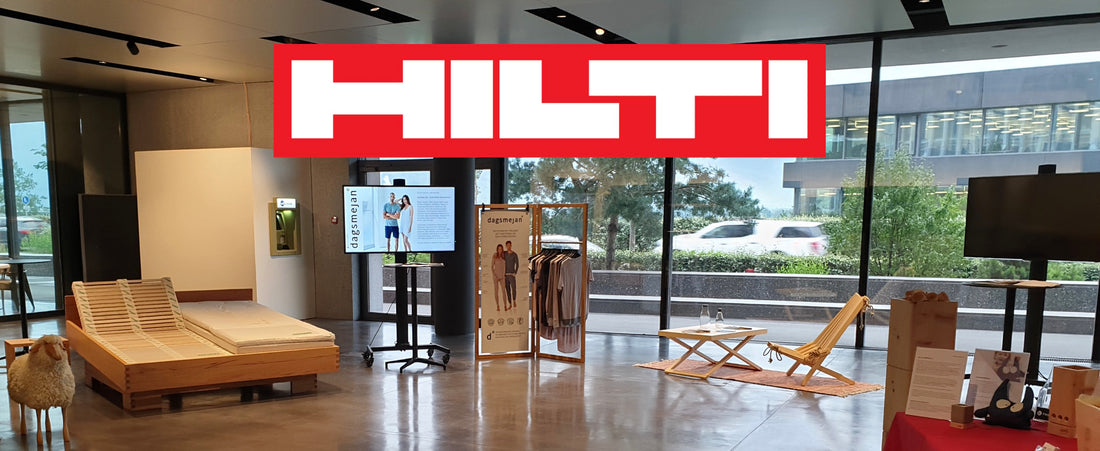
HILTI x DAGSMEJAN – Making September the SLEEPTEMBER
There is a proven link between organisational effectiveness AND sleep
In our hyper-connected, 24/7 world, many of us are losing sleep — literally. A survey conducted by Harvard Business Review of more than 180 business leaders found that four out of 10 (43%) say they do not get enough sleep at least four nights a week. Such sleep deficiencies can undermine important forms of leadership behavior and eventually hurt financial performance.
Previous McKinsey research has highlighted a strong correlation between leadership performance and organizational health. Sleep (or the lack of) is affected four key areas of organizational effectiveness:
Operating with a strong orientation to results.
To do this well, it’s important to focus and avoid distractions while at the same time seeing the bigger picture — that is, whether your company is heading in the right direction. Sleep deprivation impairs the ability to focus attention selectively: Research shows that after roughly 17 to 19 hours of wakefulness, individual performance on a range of tasks is equivalent to that of a person with a blood alcohol level of 0.05%. After roughly 20 hours of wakefulness, this same person’s performance equals that of someone with a blood alcohol level of 0.1%.
Solving problems effectively.
Sleep is beneficial for a host of cognitive functions that help us solve problems effectively, including insight, pattern recognition, and the ability to come up with innovative and creative ideas. One study has shown that a good night’s sleep leads to new insights: participants who enjoyed one were twice as likely to discover a hidden shortcut in a task as those who didn’t. Likewise, an afternoon nap has been found to aid creative problem solving: subjects who took a nap after struggling on a video game problem were almost twice as likely to solve it as subjects who had remained awake. Other research has established that creative thinking is especially likely to take place during dream sleep, enhancing the integration of unassociated information and promoting creative solutions.
Seeking out different perspectives.
A wealth of scientific studies have highlighted the impact of sleep on all three stages of the learning process: before learning, to encode new information; after learning, in the consolidation stage, when the brain forms new connections; and before remembering, to retrieve information from memory. These processes are critical to the ability to seek, encode, and consolidate different perspectives. Another important consideration is the ability to weigh the relative significance of different inputs accurately, to avoid tunnel vision, and to reduce cognitive bias.
Supporting others.
To help other people, you must first understand them. Doing so may require interpreting the emotions on their faces or their tone of voice. But in a sleep-deprived state, your brain is more likely to misinterpret these cues and overreact to emotional events, and you tend to express your feelings in a more negative manner and tone of voice.
Beyond having more rested and therefore more effective people, another argument for focusing on sleep is that it prevents burnout. There is now a large body of evidence on the bi-directional relationship between sleep and stress: a lack of sleep creates heightened emotional reactivity, and the experience of stress results in worse quality of sleep. In addition, poor sleep has been found to be a major predictor of reduced engagement at work.
SLEEPTEMBER AT HILTI - CREATING AWARENESS FOR THE IMPORTANCE OF SLEEP
HILTI Corporation has decided to take action. As a first step, HILTI has declared September to the SLEEPTEMBER as a measure to create awareness among its leaders and employees for the importance of a good night’s sleep as the key instrument for personal health and wellbeing which ultimately a key lever for organizational wellbeing with a clear call to action.
In partnership with Dagsmejan, HILTIs workplace wellbeing team is rolling-out a series of Blog Posts and Podcasts during SLEEPTEMBER covering themes such as
- Sleep & Career
- Sleep & Travel
- Sleep & Nutrition
- Sleep & Performance
Furthermore – as the foundation of a good night’s sleep is a high quality sleep system which is catering to our physiological sleep needs – leaders in sleep technologies and bedding are given the opportunity to feature latest innovation and devices on HILTI’s Market Place at Headquarters in Schaan.
A great day starts with a great night and the first step to improve sleep is to raise awareness for the importance.
Discover what smart pajamas can do for you.







